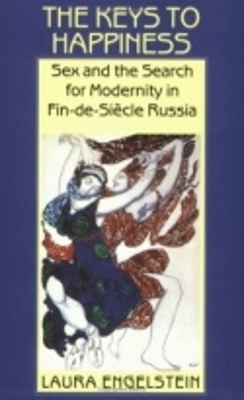
The Keys to Happiness
Sex and the Search for Modernity in fin-de-Siecle Russia
Seiten
1994
Cornell University Press (Verlag)
978-0-8014-9958-6 (ISBN)
Cornell University Press (Verlag)
978-0-8014-9958-6 (ISBN)
- Lieferbar (Termin unbekannt)
- Versandkostenfrei innerhalb Deutschlands
- Auch auf Rechnung
- Verfügbarkeit in der Filiale vor Ort prüfen
- Artikel merken
The revolution of 1905 challenged not only the social and political structures of imperial Russia but the sexual order as well. Throughout the decade that followed-in the salons of the artistic and intellectual avant-garde, on the pages of popular romances...
The revolution of 1905 challenged not only the social and political structures of imperial Russia but the sexual order as well. Throughout the decade that followed-in the salons of the artistic and intellectual avant-garde, on the pages of popular romances, in the staid assemblies of physicians, psychiatrists, and legal men—the talk everywhere was of sex.
This eagerly awaited book, echoing the title of a pre-World War I bestseller, The Keys to Happiness, marks the first serious attempt to understand the intense public interest in sexuality as a vital dimension of late tsarist political culture. Drawing on a strong foundation of historical sources—from medical treatises and legal codes to anti-Semitic pamphlets, commercial fiction, newspaper advertisements, and serious literature—Laura Engelstein shows how Western ideas and attitudes toward sex and gender were transformed in the Russian context as imported views on prostitution, venereal disease, homosexuality, masturbation, abortion, and other themes took on distinctively Russian hues.
Engelstein divides her study into two parts, the first focusing on the period from the Great Reforms to 1905 and on the two professional disciplines most central to the shaping of a modern sexual discourse in Russia: law and medicine. The second part describes the complicated sexual preoccupations that accompanied the mobilization leading up to 1905, the revolution itself, and the aftermath of continued social agitation and intensified intellectual doubt. In chapters of astonishing richness, the author follows the sexual theme through the twists of professional and civic debate and in the surprising links between high and low culture up to the eve of the First World War.
Throughout, Engelstein uses her findings to rethink the conventional wisdom about the political and cultural history of modern Russia. She maps out new approaches to the history of sexuality, and shows, brilliantly, how the study of attitudes toward sex and gender can help us to grasp the most fundamental political issues in any society.
The revolution of 1905 challenged not only the social and political structures of imperial Russia but the sexual order as well. Throughout the decade that followed-in the salons of the artistic and intellectual avant-garde, on the pages of popular romances, in the staid assemblies of physicians, psychiatrists, and legal men—the talk everywhere was of sex.
This eagerly awaited book, echoing the title of a pre-World War I bestseller, The Keys to Happiness, marks the first serious attempt to understand the intense public interest in sexuality as a vital dimension of late tsarist political culture. Drawing on a strong foundation of historical sources—from medical treatises and legal codes to anti-Semitic pamphlets, commercial fiction, newspaper advertisements, and serious literature—Laura Engelstein shows how Western ideas and attitudes toward sex and gender were transformed in the Russian context as imported views on prostitution, venereal disease, homosexuality, masturbation, abortion, and other themes took on distinctively Russian hues.
Engelstein divides her study into two parts, the first focusing on the period from the Great Reforms to 1905 and on the two professional disciplines most central to the shaping of a modern sexual discourse in Russia: law and medicine. The second part describes the complicated sexual preoccupations that accompanied the mobilization leading up to 1905, the revolution itself, and the aftermath of continued social agitation and intensified intellectual doubt. In chapters of astonishing richness, the author follows the sexual theme through the twists of professional and civic debate and in the surprising links between high and low culture up to the eve of the First World War.
Throughout, Engelstein uses her findings to rethink the conventional wisdom about the political and cultural history of modern Russia. She maps out new approaches to the history of sexuality, and shows, brilliantly, how the study of attitudes toward sex and gender can help us to grasp the most fundamental political issues in any society.
Laura Engelstein is Henry S. McNeil Professor of History at Yale University. She is author of Castration and the Heavenly Kingdom: A Russian Folktale and coeditor, with Stephanie Sandler, of Self and Story in Russian History, both from Cornell.
| Erscheint lt. Verlag | 28.7.1994 |
|---|---|
| Verlagsort | Ithaca |
| Sprache | englisch |
| Maße | 155 x 235 mm |
| Gewicht | 907 g |
| Themenwelt | Geisteswissenschaften ► Geschichte ► Regional- / Ländergeschichte |
| Geschichte ► Teilgebiete der Geschichte ► Kulturgeschichte | |
| ISBN-10 | 0-8014-9958-5 / 0801499585 |
| ISBN-13 | 978-0-8014-9958-6 / 9780801499586 |
| Zustand | Neuware |
| Haben Sie eine Frage zum Produkt? |
Mehr entdecken
aus dem Bereich
aus dem Bereich
der stille Abschied vom bäuerlichen Leben in Deutschland
Buch | Hardcover (2023)
C.H.Beck (Verlag)
23,00 €
vom Mittelalter bis zur Gegenwart
Buch | Softcover (2024)
C.H.Beck (Verlag)
12,00 €


